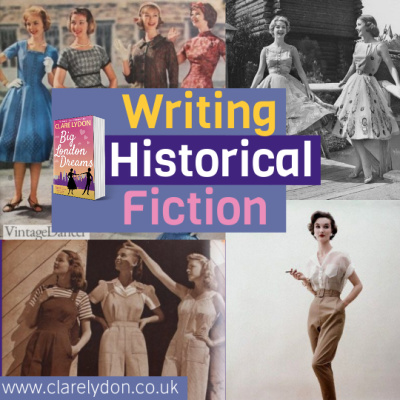
Big London Dreams was my 19th lesbian romance novel, but the first one set in any other time but the present day. Writing an historical novel scared me at first, but then I decided to do what scared me. I gave myself extra time to do the research and editing, and a little bit more to get over my publishing nerves. Now I’ve done it, what are my key takeaways?
- Write about a time period that excites and interests you. I knew I didn’t want to go back any further than the 1950s as it’s a time I can imagine, an era I can understand. I didn’t want to write about horses & carriages, or corsets. But dance halls, flared skirts and retro London? Count me in.
- Do your research. For all my other books, I usually do the research by interviewing people who are experts in their field. This was more tricky for Big London Dreams. However, my parents grew up and courted in 1950s London, so I spoke to them. I watched TV shows, read fiction & non-fiction books about the time, and watched YouTube footage of retro London streets. I live in the capital too, so I could visit the locations, walk the areas and use my imagination. I also consulted photography of the time, as well as looking at menus and interior decor of the 1950s. Google is your friend!
- Remember you’re writing fiction. Yes, I used facts from the time in my books to anchor the story – for instance, my characters go to the 1958 Boat Race, as well as the first ever CND rally in Trafalgar Square which took place that year, too – but the surrounding story and characters are made up, so you have artistic licence to make them what you want. Go mad, and ensure your characters go on a journey that keeps your readers hooked.
- Don’t use all your research. You’re not writing a history book. Facts need to be worked into the story, not crowbarred in. Get the overall details of clothing, jobs, food and money right, and you’re golden. Your readers will thank you for it.
- Don’t fall down research rabbit holes. You’ve got a deadline and a story to write!
- Don’t get bogged down in dialogue. Include some key phrases of the time, but don’t think you have to write in a whole different language of the era. Your characters are still people with feelings and emotions. They don’t change whatever the year. If you go overboard, you risk falling into cliche.
- Remember to enjoy the ride! Writing is meant to be fun. I loved writing Big London Dreams and an added bonus was that I learned so much about a London I never lived in. It’s my favourite city in the world, and now I know some of its history and the time when my parents met. I’ll cherish that forever.
Big London Dreams is available now!
